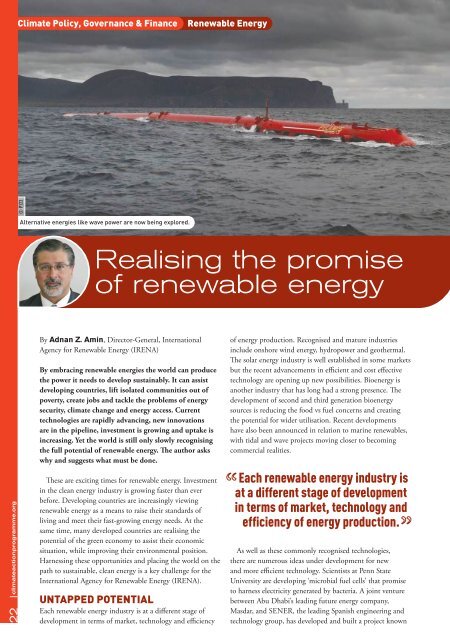Climate Action 2011-2012
You also want an ePaper? Increase the reach of your titles
YUMPU automatically turns print PDFs into web optimized ePapers that Google loves.
<strong>Climate</strong> policy, Governance & Finance<br />
Renewable energy<br />
© P123<br />
Alternative energies like wave power are now being explored.<br />
Realising the promise<br />
of renewable energy<br />
22 climateactionprogramme.org<br />
By Adnan Z. Amin, Director-General, International<br />
Agency for Renewable Energy (IRENA)<br />
By embracing renewable energies the world can produce<br />
the power it needs to develop sustainably. It can assist<br />
developing countries, lift isolated communities out of<br />
poverty, create jobs and tackle the problems of energy<br />
security, climate change and energy access. Current<br />
technologies are rapidly advancing, new innovations<br />
are in the pipeline, investment is growing and uptake is<br />
increasing. Yet the world is still only slowly recognising<br />
the full potential of renewable energy. The author asks<br />
why and suggests what must be done.<br />
These are exciting times for renewable energy. Investment<br />
in the clean energy industry is growing faster than ever<br />
before. Developing countries are increasingly viewing<br />
renewable energy as a means to raise their standards of<br />
living and meet their fast-growing energy needs. At the<br />
same time, many developed countries are realising the<br />
potential of the green economy to assist their economic<br />
situation, while improving their environmental position.<br />
Harnessing these opportunities and placing the world on the<br />
path to sustainable, clean energy is a key challenge for the<br />
International Agency for Renewable Energy (IRENA).<br />
Untapped potential<br />
Each renewable energy industry is at a different stage of<br />
development in terms of market, technology and efficiency<br />
of energy production. Recognised and mature industries<br />
include onshore wind energy, hydropower and geothermal.<br />
The solar energy industry is well established in some markets<br />
but the recent advancements in efficient and cost effective<br />
technology are opening up new possibilities. Bioenergy is<br />
another industry that has long had a strong presence. The<br />
development of second and third generation bioenergy<br />
sources is reducing the food vs fuel concerns and creating<br />
the potential for wider utilisation. Recent developments<br />
have also been announced in relation to marine renewables,<br />
with tidal and wave projects moving closer to becoming<br />
commercial realities.<br />
Each renewable energy industry is<br />
at a different stage of development<br />
in terms of market, technology and<br />
efficiency of energy production.<br />
As well as these commonly recognised technologies,<br />
there are numerous ideas under development for new<br />
and more efficient technology. Scientists at Penn State<br />
University are developing ‘microbial fuel cells’ that promise<br />
to harness electricity generated by bacteria. A joint venture<br />
between Abu Dhabi’s leading future energy company,<br />
Masdar, and SENER, the leading Spanish engineering and<br />
technology group, has developed and built a project known












